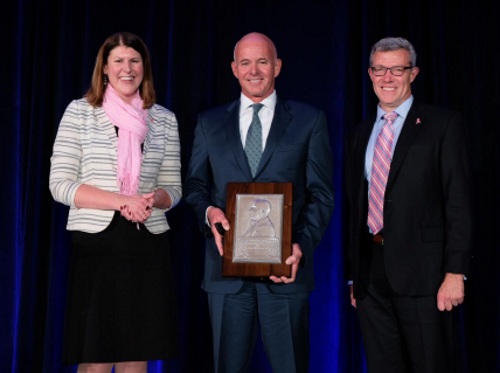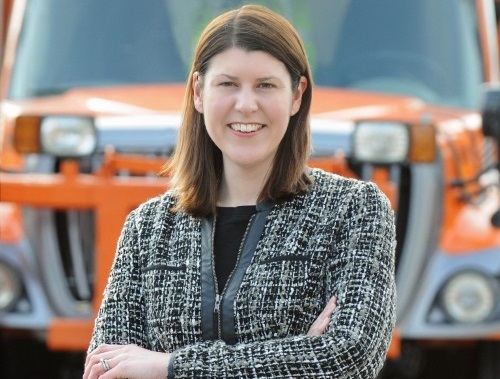Re-emphasizing the value of transportation investments to American society will be a key emphasis are for Victoria Sheehan (seen above), recently elected to be 2020-2021 president of the American Association of State Highway and Transportation Officials.
Yet that process also requires, in her words, the need to “listen to the other side, and in some cases relearn our history through the eyes of others to comprehend how past actions may have disproportionally impacted individuals or communities.”

In a speech to AASHTO’s board of directors, Sheehan – commissioner of the New Hampshire Department of Transportation – explained that her upbringing in Northern Ireland during a 30-year time period of sectarian violence known as “The Troubles” helps her understand some of the current civil rights issues of today. It is an upbringing she said also shows how transportation can be a “bridge” to help heal divisions over race, religion, politics, gender, and zip codes.
“For over 30 years, prejudice and discrimination spurred extreme violence in the country I called home, but in April of 1998 that ended when a peace agreement at long last was signed – the Good Friday Agreement,” Sheehan said in her speech. “Having lived through that experience, I know only too well what it takes to build a lasting peace. The long journey that began on Good Friday 1998 to build a country where all people had a voice and were provided the same access to opportunity … is hard work.”

It is work she said that requires taking time to reach out and actually get to know one another; breaking down stereotypes. “We need to listen to the other side, and in some cases relearn our history through the eyes of others to comprehend how past actions may have disproportionally impacted individuals or communities,” Sheehan explained. “We need to explore the biases that still exist today, both conscious and unconscious and work to bring people together to unravel those thoughts and feelings.”
A critical piece in that process is getting leaders to demonstrate they are “fully committed to making change” and one reason why the AASHTO’s board passage of a resolution addressing race, equity, diversity, and inclusion is so important.
“We’ve made a renewed commitment to refocus our energy, to strengthen, enhance, improve, and create new strategies to bring about further change,” she said. “Every person living in this country should be afforded the chance to experience the promise of freedom, equality and opportunity for prosperity described in that resolution.”

That is also why highlighting the role transportation investments play in that process will be a major focus of her one-year tenure as AASHTO president.
“In the wake of COVID-19, there is also a need to educate individuals on how changes in land use and travel choices will impact the current transportation system,” Sheehan explained. “For this reason, now more than ever, we need to engage all users of our systems, as well as other transportation stakeholders. Not just to learn how our systems can best serve those constituents, but to educate the public on how transportation impacts their daily lives, so that they want to be engaged and be a part of transportation investment decisions.”
She also stressed that, as 2021 will be a “reauthorization year,” there is a need to continue the “transportation is personal” message as the general public needs to fully understand the role transportation plays in every aspect of their lives.
“To build a transportation system that serves all and provides access to opportunity for all, we need to bring everyone to the table,” Sheehan said. “We need to help people better understand the value of transportation and how it impacts quality of life.”
 AASHTO Annual Meeting
AASHTO Annual Meeting


